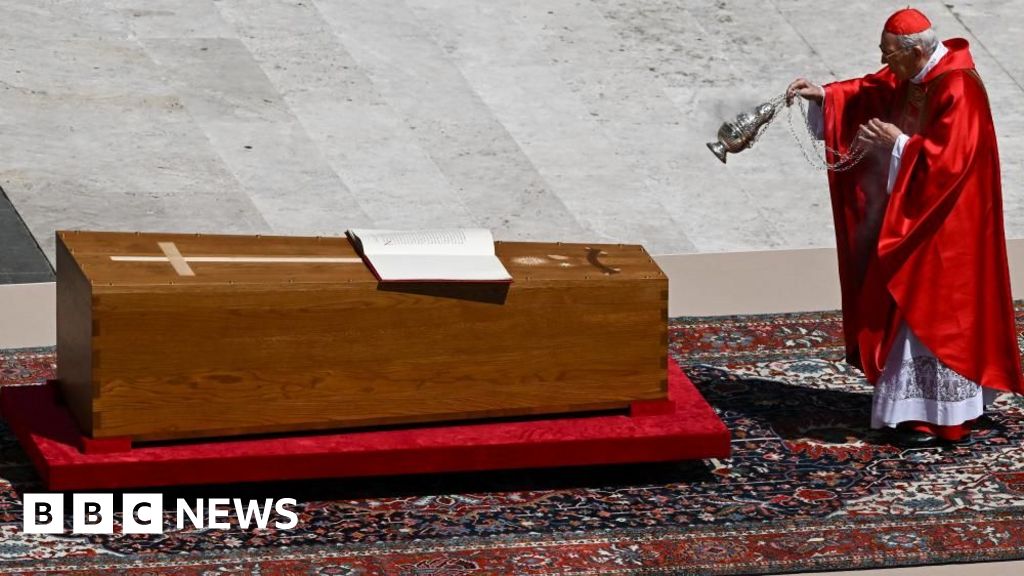ARTICLE AD BOX
By Catherine Byaruhanga
BBC News Africa correspondent
Image source, Getty Images
Three-month old Surafeal Mearig lies helpless at the biggest hospital in Ethiopia's war-torn region of Tigray.
His eyes are wide open, and his ribs press against his thin-wrinkled skin. He is among many children suffering from malnutrition because of the 14-month civil war that has also spread to the neighbouring Afar and Amhara regions.
Surafeal's paediatrician at the Ayder Referral Hospital in Tigray's capital, Mekelle, told Reuters news agency that he weighs 2.3kg, one kilogramme less than he did at birth.
Warning: Some readers may find an image below distressing
According to medical notes published by the hospital's staff, his mother's milk has dried up and his parents, now both unemployed, cannot afford formula milk.
Crucially, staff at the hospital say they are running out of therapeutic foods to treat children like Surafeal.
"It is now six months since any supply has come here from Addis Ababa [the federal capital]," a doctor at the hospital told the BBC on condition of anonymity as he feared his family could be targeted.
"We've almost finished what we had since our last supply arrived in June. Everything is running out," he added.
This week medical personnel at Ayder Hospital presented a report to international aid agencies asking for help.
Surafeal was one of the case studies they referred to.
Image source, Reuters
Image caption,Surafeal Mearig is among the many children who are suffering because of the conflict
The medics said more than 40% of children aged under five years who come to the hospital are malnourished - double the 2019 rate.
Bone thin, four-year-old Medhaniye also lies in a hospital bed, a feeding tube connected through his nose.
His medical report says he started suffering from malnutrition after soldiers attacked his family home slaughtering their ox, destroying and looting property.
The BBC is unable to independently verify the details in the doctors' report as much of Tigray has been under a communications blackout since November 2020 when the conflict broke out between the Tigray People's Liberation Front (TPLF), which is in control of much of the region, and the federal government. Journalists have also not been able to visit Tigray since July.
Stopping bleeding with bare hands
In their report the doctors blame a six-month "blockade" by federal forces and their allies for the severe shortage of medicines and equipment which they say are leading to avoidable deaths.
"Since the region was besieged, another 35 patients have lost their lives due to dialysis service absence," the report says.
Doctors say they have been forced to stop bleeding with their bare hands, wash and reuse gloves or make their own disinfectant fluids.
In his response, government spokesman Legesse Tulu told the BBC the report seemed to "seeking to build a narrative" for the TPLF and "mimics" its claims of a blockade on Tigray.
"From the government side, there is no deliberate embargo in Tigray that damages our people," he said.
But since the war began, aid agencies have complained about not being able to get much aid into Tigray.
Image source, Getty Images
Image caption,Civilians have been killed or wounded in airstrikes by the Ethiopian military
According to the latest report by the United Nations Office for the Coordination of Humanitarian Affairs (Ocha) on 30 December, aid convoys have not reached Tigray since mid-December because of bureaucratic delays and insecurity.
The World Food Programme estimates that 100 trucks carrying aid need to reach Tigray each week to meet the needs of more than five million people but according to Ocha only 12% of the supplies needed have made it into the region.
In response to queries about aid deliveries Mr Legesse said: "Over 840 of the 1,100 vehicles providing food and medicine to Tigray have yet to be returned. They are suspected of being used by the TPLF to carry illegal recruits, soldiers and military supplies."
The TPLF has denied claims it is hampering aid assistance, but its forces have also been accused of looting aid stores and health facilities in areas it occupied in Amhara and Afar.
The doctor at Ayder Hospital told the BBC that even the families of staff were being affected by the crisis.
"My child has appendicitis and cannot get treatment," he said.
And as the shortages continue he says they will have no choice but to stop all surgery by next week.
"We don't have supplies. That's the point we've reached now, which is why we wanted to let the world know. Most hospitals are closing."

 3 years ago
47
3 years ago
47








 English (US) ·
English (US) ·